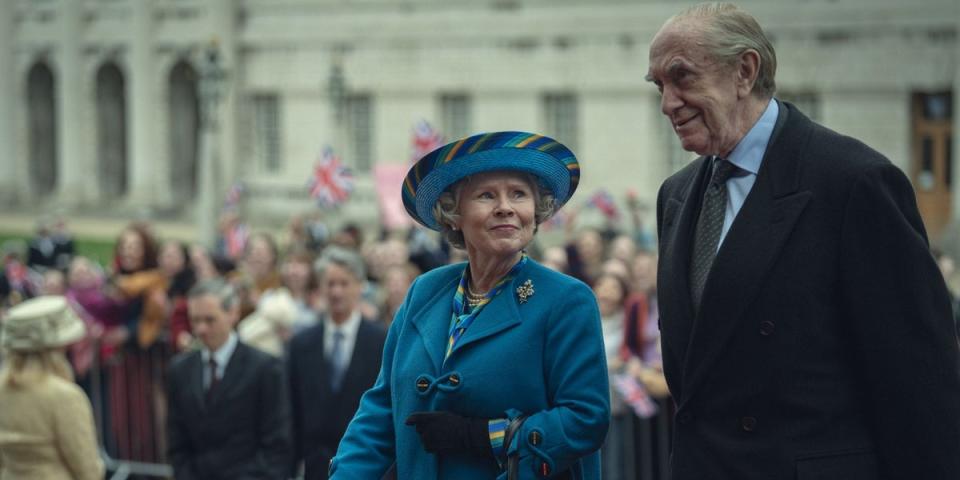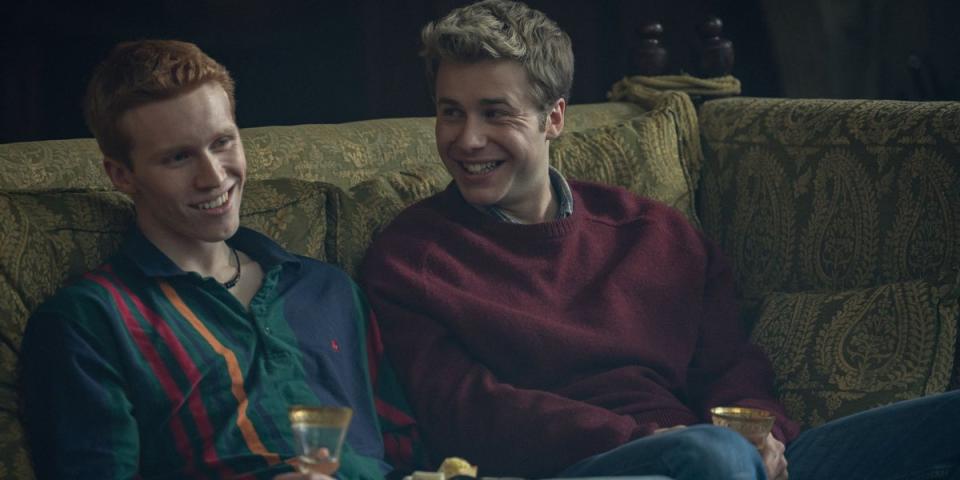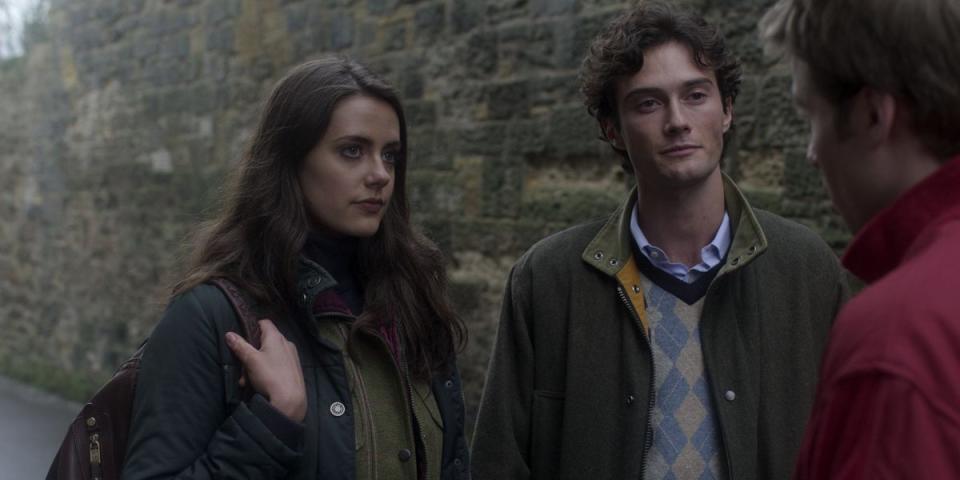The Crown Season 6 Part 2 on Netflix review: Wills, Harry and co bow out with a last few royal rumbles
Let me say at the off that I was dreading this series of The Crown. After the Diana episodes that ended with her death, the lights seemed to go out. And who wants to watch the younger royals at play? They’re just not that interesting: Wills, Kate, Harry. As for Meghan, well, fortunately this stops before her day. And the inexorable rise of Camilla isn’t something I care to dwell on.
There wouldn’t be any excitements in store, I grumbled – not like the Bolshevik murder of the Romanovs which kicked off an episode about Prince Philip in Series Five; nor the genuine drama of poor Princess Margaret’s romance with Peter Townsend, which she gave up for the sake of the Church of England’s teaching on marriage.
The only really interesting things about this sixth and final season promised to be the deaths – of Princess Margaret and the Queen Mother, the people who shared a past and a way of thinking with the Queen.
But actually it is, to use William’s favourite word when Charles asks how he's doing, fine. The hours you spend on The Crown will never be returned to you, but it’s often engaging and Peter Morgan has an uncanny knack for filling in the necessary gaps between what we know and what we don’t intelligently.
He conveys atmosphere with aplomb – the young toff environment at St Andrew’s, say, or the contained ecstasy of the Ritz on VE day. If you liked the previous series of The Crown, there’s a good chance you’ll like these. And if this sounds like faint praise, it’s the best I can do.
Season six part two revolves around the Queen and Prince William, and ends with a coming together of the two of them. William starts off raw from his mother’s death and hating his father for what he sees as his part in it. He ends in a relationship with Kate Middleton, at her agreeably middle class home, with her mother, Carole, looking understandably like the cat that got the cream.

After the exciting posthumous appearance of Diana in the first part of this series, we have come to expect some bizarre conceit, and we got it in the second episode of this second part, where we find Imelda Staunton wandering disconsolately around St James’s looking at a pub sign with her image being taken down.
At Westminster Abbey there’s a splendid coronation ceremony underway, only instead of Zadok the Priest, the choristers are singing Things Can Only Get Better. No, it’s not Charles prematurely taking over from his mother, but the coronation of King Tony and Queen Cherie, with Cherie grinning from ear to ear in ermine.
This, at least is the spectre that haunts the dreams of the Queen, who is brooding about how her prime minister is so much more popular than she is. Then she wakes up.
An episode where she invites Blair to give a New Labour overhaul to the monarchy is almost parodic. She summons in turn every ancient office holder from the Keeper of the Queen’s Swans to the Strewer of the Queen’s herbs only to find, whaddya know, that these offices are all ways of maintaining skills that would otherwise vanish and a vindication of tradition.
As for Blair’s popularity relative to hers, she had the last laugh. Bertie Carvel here sounds less uncannily like Blair than Michael Sheen in The Queen, but he comes pretty close.
The least plausible episode is, I’d say, the Kate-Wills romance, with Meg Bellamy a cuter version of Kate. We see Kate’s early crush on William and Carole Middleton’s iron resolve that if anyone is going to get this prize, it’s her daughter. Kate’s every move, from her choice of university and subject, to the activities in her gap year are all selected with one object in view, viz, to allow for the greatest possible proximity to William.

But here we’re invited to believe that it was Carole – Eve Best here begins where Mrs Bennett leaves off – who propelled her daughter into this ambitious matrimonial stakeout.
Oh yes? Nothing we know suggests that Kate was anything but as steely as her mother about the operation. Poor William didn’t stand a chance, but here he’s made to look like the prime mover and she the catch. “She could have anyone she wanted”, he breathes to the Queen about his new girlfriend. His grandmother observes unanswerably that he’s rather a catch himself. There have been wars planned with less formidable organisation.
Ed McVey as William and Luther Ford as Harry have a close relationship in this series – poignant, given what was to come – but the theme of the second son, the spare, is already there, a source of tension.
“William the saint, Harry the sinner”, snarls Ford, taking time out from being a prop for his brother to show the resentment that would, in the fullness of time, take shape and be propelled into the world in his biography, Spare.
One of the games to play in The Crown is to spot whom the characters actually resemble. Luther Ford is an odd mix of Eddie Redmayne and Rory Stewart while Ed McVey channels William while also looking a bit like Brad Pitt. Jonathan Pryce has, I would say, the demeanour and outlook of Prince Philip to an uncanny degree but he does look a bit like Pope Francis. Salim Daw is, however, practically Mohammed Al-Fayed’s double. Extraordinary.
Dominic West remains excellent as Charles, whom we first meet trying desperately hard to re-establish a relationship with William, only to meet a stony response. Some, though, neither look the part nor capture the spirit, and chief of these is Marcia Warren, who plays the Queen Mother as a skinny, batty old dear forever wittering about chocolates rather than the shrewd, well-padded, hard-boiled egg she undoubtedly was.
Lesley Manville is more plausible Princess Margaret, though she doesn’t resemble her. The episode that concludes with her death is moving, cut with recollections of that heady night on VE Day when the two princesses headed out to celebrate incognito, and here we find that Elizabeth (Violet Prettejohn making a welcome return as the young princess) ended up snogging a black American GI.

For Margaret, this summed up the sacrifice the Queen made in subordinating her real self to the machine of duty and royalty. Margaret’s high living – and that in the show, if anything, downplays the original – and enjoyable excesses lead inexorably to a series of strokes that are unbearably poignant. We get her stoicism here too. She was the spare once, but she kept her disaffection private.
The final episode, which could be christened Two Funerals and a Wedding, sees the Queen and Prince Philip planning their funerals – there’s a committee about it, obviously – and Charles finally getting his way and marrying Camilla.
His encounter with the Queen to get her to agree is the basest element of this series – he squarely puts the blame for Camilla’s marriage breakdown on her husband, Andrew Parker Bowles – “serially unfaithful” – while Camilla gets absolved of the most public cuckolding in British history.
The controversial element is saved until last: the contention that the Queen intended abdicating at Charles’s wedding. Here her past selves pop up – Olivia Coleman to argue she should step down; Claire Foy to observe “if you step down you will be representing instability”. But really, it’s Jonathan Pryce as Duke of Edinburgh who presents the real reason: “Those that come after you are not remotely ready to take over… you were always ready. By contrast, this lot…” Just so.
This is meant to be the last season of The Crown, and I’d like to exhort Peter Morgan to stick to his guns on this. Anything further would feature royals who are a poor substitute for the large characters of the twentieth century. Leave it at this… please? You have delighted us enough.
The Crown Season 6, Part 2 is streaming now on Netflix

 Yahoo News
Yahoo News 
